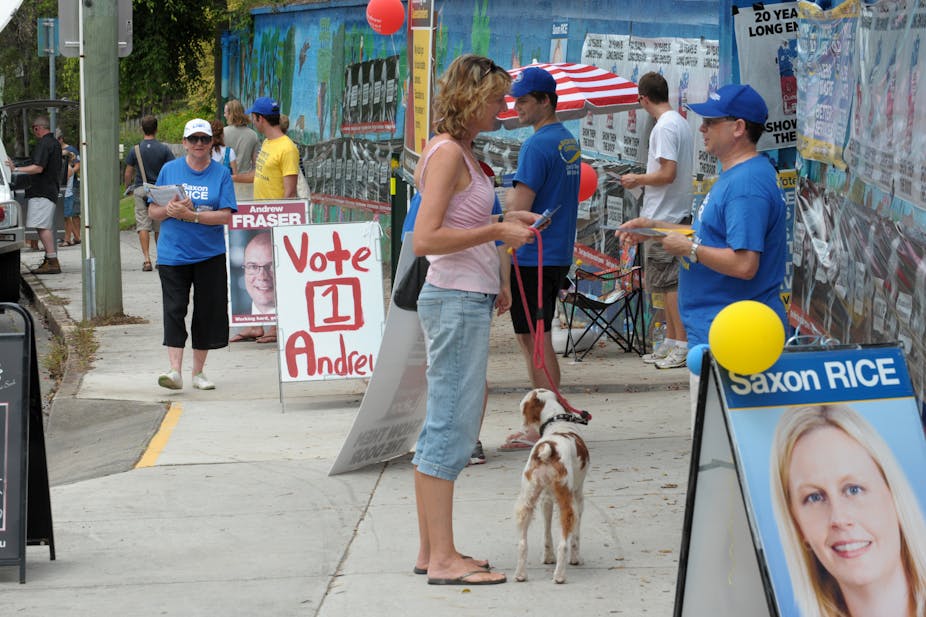Is there a role for deliberation about electoral rules?
For many, the answer would be “no”. For them, the notion of principled discussion informed by careful reflection is deeply incongruous with the grubby practice of politics.
Politics, so they would say, is centred on the pursuit of political power. Political parties and politicians, in turn, are purely self-interested actors doing “whatever it takes” to grab the reins of power and using that power for their partisan interests.
The modus operandi is one of power plays and bargaining, not deliberation.
If these views were plausible, they should be seen most clearly in the rules of the electoral game – the regulation of elections.
The myth and the reality
In electoral democracies like Australia, it is these rules that set the terms of the contest for political power. With so much at stake, we would expect - according to the paradigm of self-interest - for dominant parties to rig these rules in their favour.
It is puzzling then to discover the prevalence in Australia of the rhetoric of “free and fair” elections, even amongst the political class. Even more puzzling is that Australia’s electoral system does, in key respects, provide for “free and fair elections”.
Is it all a sham?
Take two examples for which Australia is internationally renowned: first, the secret ballot - known internationally as the “Australian ballot’” as it was pioneered here - which promotes free choice for voters; second, the impartial administration of electoral rules by independent electoral commissions, a necessary condition for fair elections.
A principled stand
There is a need then for a more nuanced understanding of the role of political deliberation. Principles, as well as partisanship, find a place in democratic politics, with the laws reflecting both.
And if principles are crucial to politics, so is deliberation, not least for its ability in many situations to filter out hollow rhetoric and more clearly delineate the legitimate, as opposed to illegitimate, self-interest of political actors. Rather than being anathema to the practical realities of party politics, deliberation lies at its heart.
Defending the role of deliberation in politics is not the same, of course, as realising it in practice. Institutionalised forums for such deliberation are vital, especially in relation to the regulation of elections.
In a parliamentary democracy like Australia, parliaments (and their committees on electoral matters) are central to providing such forums.
Working together
There is, however, a need to institutionalise forums for deliberating electoral regulation beyond the parliamentary setting. And it is this imperative that prompted the establishment of the Electoral Regulation Research Network earlier this year.
Its principal purpose is to foster exchange and discussion amongst electoral commissions, academics and other interested groups on research relating to electoral regulation.
This objective is perhaps much easier to state than to achieve. The institutional context of electoral regulation is thick and complex. Different groups have varying functions: the primary task of the electoral commissions is to administer electoral regulation; political parties and politicians seek to advance their ideological agendas through elections; and academics in this field view electoral regulation as an object of study.
With different functions come a range of operative principles. With electoral commissions, the principles of independence and neutrality are key, while the animating principles of political parties are those of political contestation, a mixture of partisanship and ideological beliefs.
The virtue of deliberation
When it comes to deliberating electoral regulation and research on this topic, these varying functions and principles can give rise to different benchmarks of relevance: Is a research question significant from the point of view of administering electoral laws? Is there enough scholarly interest in the question? Does it matter in terms of voter interest?
Such diversity does not, however, spell defeat. Deliberation neither presupposes nor does it typically produce a chorus of unanimity. On the contrary, it is sustained and nourished by the expression of diverse viewpoints.
Disagreement is the starting point and invariably the end point of deliberation. The virtue of deliberation is that it holds out the promise of disagreement being grounded on a more principled basis.
Deliberation of research on electoral regulation will need a “meeting ground” where different perspectives are valued and heard. This implies judicious selection of topics of shared concern. Tensions will inevitably arise.
Yet, if the alchemy of deliberation works its effects, these will be productive tensions leading to the broadening of horizons and respectful learning.

